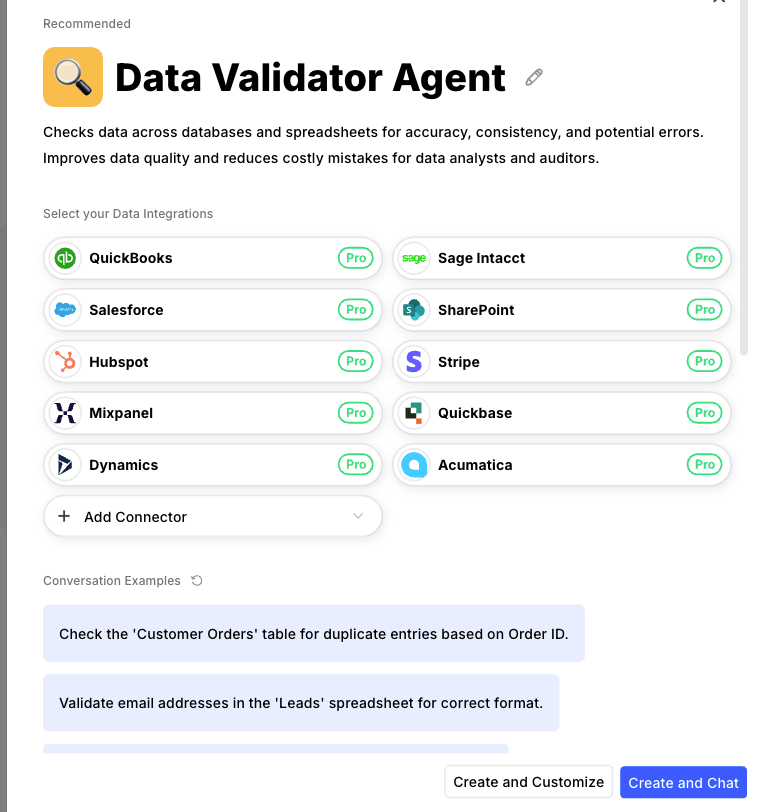Support reps toggle between CRM, billing, and ticketing systems just to confirm one customer address. System switches consume 3.5–9 hours weekly across teams—time spent copying data between spreadsheets, writing ad-hoc queries, and managing manual validation across numerous business systems.
Manual data checks create bottlenecks that scale poorly and invite expensive errors. Samsung Securities lost $187 million in minutes from a single data entry mistake, destroying market value and triggering regulatory action.
AI agents eliminate this manual constraint entirely. They validate, standardize, and correct data across connected systems continuously—catching discrepancies before they impact operations and freeing skilled workers from routine data verification.
Teams reclaim several hours each week for strategic work while maintaining higher data accuracy than manual processes ever delivered.
How AI Agents Ensure High Data Quality
AI agents are autonomous software tools that act independently to process, validate, and correct data based on defined rules and learned patterns. Unlike traditional automation that simply follows rigid instructions, AI agents make intelligent decisions, adapt to new situations, and continuously improve their performance through machine learning.
For data quality, these agents function as tireless data specialists that monitor information across your business systems, detecting and resolving issues without constant human supervision.
Your team checks 15 different systems to confirm a single customer record because manual data-quality processes break under scale. More than 70% of organizations struggle with duplicate or inconsistent data that slips past human review, slowing decisions and eroding trust in reports.
AI agents solve this by working as autonomous data specialists that monitor every field, in every system, continuously.
Data quality challenges that AI agents directly solve include:
- Inconsistent formatting - Names, addresses, and dates appearing differently across systems
- Silent duplicates - Nearly identical records that human eyes miss during manual review
- Incomplete records - Missing fields that create downstream processing failures
- Cross-system discrepancies - Different values for the same data points across platforms
- Outdated information - Stale data that no longer reflects current customer reality
AI agents connect to your CRM, ERP, billing platform, and other applications through standard APIs. They combine machine learning, natural language processing, and metadata management to profile incoming records, spot anomalies, and apply fixes before errors cascade downstream.
When a new order enters the pipeline, the agent instantly validates addresses, credit limits, and product SKUs; any mismatch triggers automatic correction or real-time alerts instead of month-end fire drills.
Implementation happens without replacing existing platforms. A phased rollout lets the agent attach to one high-impact system at a time, keeping current workflows intact while automated checks prove their value.
The agent starts with obvious clean-ups (missing ZIP codes, incorrect date formats, duplicate contacts) using rule templates you can adjust immediately.
As confidence builds, it enforces dynamic standards learned from your data history and query patterns, using metadata-aware models that generate new quality checks automatically.
Real-time validation prevents bad data from reaching customer-facing processes. Because the agent sits inside live data pipelines, it evaluates each transaction as it arrives rather than after problems occur.
This eliminates service escalations and financial write-offs that manual spot checks miss. Continuous monitoring keeps policies current with evolving schemas and regulations.
The agent learns from every correction you approve. Patterns once flagged for review become auto-corrections executed with high confidence, reducing human touchpoints required to maintain data quality.
The result is a self-improving system that scales with your transaction volume, delivering clean, reliable data without adding headcount or forcing platform migrations.
Use Cases Of AI Agents for Data Quality Checking
Manual verification creates its own bottlenecks in every business system, but AI agents address the root cause by eliminating cross-system validation entirely:
- Customer Data Management: Customer information scattered across CRM, support, and billing systems creates verification delays that slow every interaction. Agents monitor every connected system simultaneously, propagating address updates across CRM, billing, and marketing platforms automatically. Complete customer profiles load instantly instead of the 10-15 minutes teams spend cross-referencing systems.
- Financial Data Validation and Reconciliation: Month-end close stretches across days when teams manually reconcile revenue information between financial systems and CRM platforms. Agents continuously validate revenue, billing, and contract information across all connected systems, completing routine reconciliations automatically. Finance teams that spent 12-16 hours reconciling numbers now complete month-end validation in under an hour.
- Supply Chain and Inventory Data Monitoring: Inventory discrepancies between warehouse systems and ERP platforms cause stock-outs that damage both revenue and customer relationships. Agents maintain real-time synchronization between warehouse counts, ERP records, and ecommerce listings, flagging discrepancies before customers can order unavailable items. This prevents 5-10 weekly "out-of-stock" incidents that typically require expedited shipping.
Key AI Agent Capabilities that Ensure Data Quality
Your team doesn't need another dashboard; you need tireless workers that keep data clean while everyone else sleeps.
AI agents deliver exactly that, and the four capabilities below explain why operations managers replace weekend reconciliation marathons with a quick Monday-morning glance at a quality report.
Autonomous Operation and Minimal Manual Intervention
AI agents run quality checks hourly instead of weekly, automatically fixing routine errors without human input and reducing manual work.
Picture the weekly audit you run to reconcile CRM, billing, and support data. An AI agent takes that checklist, runs it every hour, and fixes anything it understands without pinging you first. Because the agent monitors data streams 24/7, you reclaim the late-night and weekend hours once reserved for emergency clean-ups.
Platforms that pair machine learning with metadata management detect and correct duplicates, missing fields, and formatting errors automatically, lifting the heaviest tasks off your plate while you focus on higher-value work.
Teams using this approach report that agents resolve the vast majority of issues automatically, leaving only edge cases for human review. Fewer manual touchpoints means a direct fix for the staffing bottleneck that appears every time data volumes spike.
Intelligent Data Processing and Validation
Agents standardize data formats across systems in minutes instead of hours, automatically merging duplicates and enforcing consistent rules that eliminate downstream errors. Before agents, standardizing addresses across your CRM, ERP, and billing systems could chew up a full afternoon.
Now an agent applies predefined business rules—state abbreviations, postal-code formats, required fields—and augments them with patterns it learns over time. It spots "123 Main St." versus "123 Main Street," merges the records, and updates downstream systems instantly.
Intelligent preprocessing also flags outliers, missing values, and contradictory fields the moment they surface. Tasks that once took hours between exports, spreadsheets, and SQL scripts now finish in minutes because validation happens in-flight.
As the agent learns your preferred formats, it quietly enforces those standards, eliminating the inconsistencies that clog downstream analytics and lead to wrong-time, wrong-decision moments.
Real-Time Perception and Decision-Making
Agents catch data errors at entry points before they cause downstream problems, preventing service escalations and revenue delays by validating information in real-time.
A customer mistypes the shipping address while placing an order. Instead of discovering the mismatch during a month-end audit, the agent compares shipping and billing details in real time, corrects the format if it's sure, and flags the record only when confidence drops.
Because validation happens at the entry point, incorrect data never cascades through fulfillment, invoicing, or support. This continuous monitoring prevents service escalations and revenue delays, delivering smoother customer experiences and faster order cycles.
Scalable Cross-System Data Handling
Agents handle 3x transaction volumes without adding staff, maintaining consistent quality standards across all connected systems by scaling through API connections instead of headcount. Manual processes scale by adding headcount; agents scale by adding API connections.
When seasonal demand triples your transaction volume, the agent simply processes more records per minute without a single overtime request. It reaches into every connected platform—CRM, ticketing, finance, warehouse—via standard APIs, monitors data flows, and applies the same quality rules everywhere.
Because each new system becomes just another endpoint, your data-quality capacity grows with the business instead of lagging behind it. Whether you're onboarding a new acquisition or bracing for a holiday sales surge, consistent quality standards hold steady regardless of data volume.
Together, these capabilities transform quality management from a recurring fire drill into a background process that quietly keeps your business moving forward.
Top AI Data Quality Checking Tools
Selecting the right AI data quality tool depends on your specific business needs, existing tech stack, and scale requirements. Here are leading platforms that help organizations maintain clean, reliable data:
Datagrid
Datagrid combines powerful data connectors with intelligent AI agents to create a comprehensive automation ecosystem for data quality management. The platform integrates with over 100 data platforms, including CRM systems like Salesforce, HubSpot, and Microsoft Dynamics 365, marketing automation tools such as Marketo and Mailchimp, and BI platforms like Tableau and Power BI.
Datagrid's AI agents automatically clean and enrich datasets, apply consistent validation rules across connected sources, detect anomalies before they impact operations, and generate quality reports with specific improvement recommendations.
Unlike basic validation tools, these agents handle complex decisions that previously required human judgment, operating 24/7 without manual oversight. The platform is designed specifically for professionals who need to automate tedious data tasks, reduce manual processing time, and improve team productivity through seamless integrations.
Nanonets
Nanonets offers AI-powered data extraction and validation capabilities that help businesses process unstructured data from documents, emails, and other sources. The platform uses machine learning to understand document layouts and extract information with high accuracy, then validates this data against predefined rules and business logic.
Nanonets excels at handling invoices, receipts, forms, and other document types that traditionally require manual data entry, automatically flagging inconsistencies and formatting issues for review.
Talend
Talend provides enterprise-grade data quality and governance tools with built-in AI capabilities for data profiling, cleansing, and monitoring. The platform offers pre-built quality rules and machine learning algorithms that identify duplicate records, standardize formats, and enrich data from external sources.
Talend's strength lies in its ability to handle large-scale data operations across complex enterprise environments, with robust governance features for regulatory compliance.
Ataccama ONE
Ataccama ONE delivers AI-driven data quality management with strong capabilities in master data management and data governance. The platform uses machine learning to automate data quality rules creation, identify patterns in data issues, and suggest corrections.
Ataccama excels at managing complex data relationships across multiple systems, offering automated matching and merging of records, continuous monitoring, and self-service data quality tools for business users.
Informatica
Informatica provides comprehensive data quality solutions powered by AI and machine learning through its CLAIRE engine. The platform offers automated data profiling, intelligent recommendations for data quality rules, and continuous monitoring across cloud and on-premises systems.
Informatica's AI capabilities help identify hidden data quality issues, predict data quality trends, and automate remediation workflows at enterprise scale.
How Datagrid Simplifies Data Quality Check Automation

Agentic AI is transforming how businesses handle routine tasks, freeing professionals to focus on work that truly matters. Datagrid's AI-powered platform combines powerful data connectors with intelligent AI agents to create a seamless automation ecosystem.
Streamlining Data Validation Workflows
The core value of AI agents comes from replacing tedious data tasks that drain productivity. Datagrid's agents automatically:
- Clean and enrich messy datasets, including automating lead enrichment
- Apply consistent validation rules across connected datasets
- Detect anomalies and discrepancies before they impact operations
- Generate quality reports with specific improvement recommendations
- Operate 24/7 without manual oversight or intervention
Unlike basic validation tools, these AI agents handle complex decisions that previously required human judgment. They evaluate data across multiple integrated sources to identify quality issues, automatically correct routine problems, and flag only genuine exceptions that require human expertise.
Creating Seamless Data Connections
At the foundation of Datagrid's offering are robust data connectors that integrate with over 100 data platforms. These connections enable:
- Seamless information flow between CRM systems like Salesforce, HubSpot, and Microsoft Dynamics 365
- Integration with marketing automation platforms such as Marketo and Mailchimp
- Synchronization with BI tools like Tableau and Power BI for comprehensive data analysis
This integration network ensures that customer information, lead data, and sales pipeline stages remain up to date and accessible across your entire technology stack, enabling you to enhance productivity through integrations, such as connecting Salesforce and DocuSign effortlessly.
Delivering Enhanced Productivity Benefits
The productivity advantages of agentic AI extend beyond simple time savings:
- Improved Accuracy and Consistency: AI systems perform repetitive tasks with higher reliability than humans, without experiencing fatigue or loss of focus.
- 24/7 Operational Capability: AI agents can function continuously without breaks, enabling round-the-clock business operations.
- Personalization at Scale: By analyzing communication patterns and user behavior, AI agents can tailor outreach across various platforms to ensure messages resonate with each recipient.
With Datagrid's AI agents handling routine tasks like data entry, scheduling, and basic analysis, your team can dedicate more time to strategic thinking, relationship building, and creative problem-solving—the uniquely human capabilities that drive business growth.
Don't let data complexity slow down your team. Datagrid's AI-powered platform is designed specifically for insurance professionals who want to:
- Automate tedious data tasks
- Reduce manual processing time
- Gain actionable insights instantly
- Improve team productivity
See how Datagrid can help you increase process efficiency.













